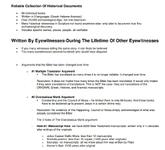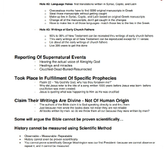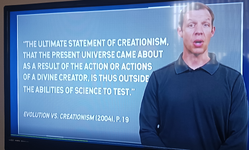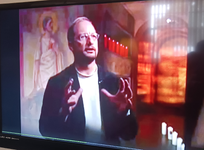I thought I would start a thread for those who are new to the forum, new to Christianity in any form, or questioning their beliefs and want to see some inspiring truths for the existence of God, of Christ's divinity, and of the historicity of biblical texts and events.
This video is a compilation of some of the best argumentative talks on compelling data. Those of us who had the faith before may feel renewed listening and watching this, for we knew our faith was righteous, but for those who are new, I hope this steers you all onto the right path in the present and coming days, when you will need your faith more than anything else.
The most typical argument I hear from people who don't believe in the Bible is that it was "made up" or "corrupted" or "a bunch of men sitting around trying to control everyone." They know none of its true history, and here it is for all to see. This video compilation has been taken down numerous times, and they will not allow it on youtube.
"Primordial Truth: (YHWH) God & Jesus are real. Insurmountable Evidence Marathon."
One of the first segments with the black preacher, Voodie Baucham, is a great little bit of history and investigative reasoning to remember the next time you are confronted by someone who tests your faith by claiming the Bible was fake. I will put some of his content on here for a beginning bit:
This is from his own response on "Why do I choose to believe in the Bible?"
“I choose to believe The Bible because it is a reliable collection of historical documents, written by eyewitnesses during the lifetime of other eyewitnesses, reporting supernatural events that took place in fulfillment of specific prophecies and claimed their writings are Divine and not of human origin.”


This video is a compilation of some of the best argumentative talks on compelling data. Those of us who had the faith before may feel renewed listening and watching this, for we knew our faith was righteous, but for those who are new, I hope this steers you all onto the right path in the present and coming days, when you will need your faith more than anything else.
The most typical argument I hear from people who don't believe in the Bible is that it was "made up" or "corrupted" or "a bunch of men sitting around trying to control everyone." They know none of its true history, and here it is for all to see. This video compilation has been taken down numerous times, and they will not allow it on youtube.
"Primordial Truth: (YHWH) God & Jesus are real. Insurmountable Evidence Marathon."
One of the first segments with the black preacher, Voodie Baucham, is a great little bit of history and investigative reasoning to remember the next time you are confronted by someone who tests your faith by claiming the Bible was fake. I will put some of his content on here for a beginning bit:
This is from his own response on "Why do I choose to believe in the Bible?"
“I choose to believe The Bible because it is a reliable collection of historical documents, written by eyewitnesses during the lifetime of other eyewitnesses, reporting supernatural events that took place in fulfillment of specific prophecies and claimed their writings are Divine and not of human origin.”




